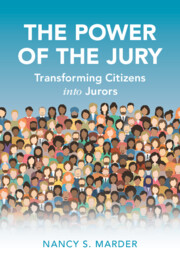3 results
3 - Peremptory Challenges: A Barrier That Unnecessarily Limits Who Can Serve as Jurors
-
- Book:
- The Power of the Jury
- Published online:
- 25 August 2022
- Print publication:
- 15 September 2022, pp 76-112
-
- Chapter
- Export citation

The Power of the Jury
- Transforming Citizens into Jurors
-
- Published online:
- 25 August 2022
- Print publication:
- 15 September 2022
12 - The Russian Jury Trial
- from Part III - Challenges to Lay Participation in Law
-
-
- Book:
- Juries, Lay Judges, and Mixed Courts
- Published online:
- 03 August 2021
- Print publication:
- 29 July 2021, pp 237-260
-
- Chapter
- Export citation

